This article was co-authored by Stephanie Riseley, MFA. Stephanie Riseley is a Hypnotherapist, Life, and Spiritual Coach based in Los Angeles, California. Stephanie merges neuroscience with spirituality to help people discover their own power and their soul purpose. Certified in Past Life Regression Therapy by the psychiatrist, Brian Weiss, MD, and the Brian Weiss Institute, she also uses Cognitive Behavior Modification and Awareness Therapy to help people heal. With over 30 years of experience, Stephanie conducted research for the DSM III (R), the manual of psychiatric disorders, at UCLA's Neuropsychiatric Institute. She earned a BA from the University of California, Berkeley, and an MFA from the University of California, Los Angeles.
There are 8 references cited in this article, which can be found at the bottom of the page.
This article has been viewed 141,399 times.
The use of hypnosis to help improve your memory is a common technique for therapists to help their patients remember traumatic childhood memories and law enforcement officials trying to get eyewitnesses to remember key details of a scene or event.[1] A study done by a research team at Ohio State University found that memories recovered through hypnosis need to be verified by other sources before it can be used as evidence in a case or as proof of a traumatic experience for a patient in therapy.[2] But you can use hypnosis to get better at recalling information you may have forgotten, like the code to a safe or a password, or retain information you may need later for a test or exam through hypnotizing yourself or being hypnotized by a professional hypnotist.
Steps
Using Self-Hypnosis
-
1Be aware of how hypnotism works. Contrary to popular belief, hypnosis does not put you to sleep, render you unconscious, put you under someone’s spell, or cause you to do anything you do not want to do. In fact, hypnosis is a state of mind where you are very focused on suggestions being made to you and you are more receptive to these suggestions. For hypnosis to be effective, you will need to have an open and uncritical attitude towards hypnosis. Avoid being resistant to the process, as the more skeptical you are, the less effective hypnosis will be on you.[3]
- To use hypnosis to improve your memory, you will need to store information in your brain and be able to retrieve it while under hypnosis. This is similar to the memory palace method, which is a type of mnemonic, a learning device that can help you recall difficult information. You can picture your memory palace when you’re in hypnosis and use it to store information you may need to retain later.
-
2Sit in a comfortable position in a quiet, dim room.[4] This will help you to relax and focus. You can also take off your shoes, put on loose clothing, and put a blanket on your legs.Advertisement
-
3Choose an object in the room to focus on. Use an object that you have a strain a bit to focus on, about five to seven feet away from you. This could be the corner of a picture frame on the wall, a smudge on the wall, a tree out the window, etc.[5]
- As you look at the spot, repeat these words silently to yourself: “My eyelids are becoming heavier and heavier. My eyelids feel as if they are being pulled down by a heavy weight. Soon they will so heavy they will close.”
- Repeat these words every 30 seconds and focus on your eyelids. You should feel them start to get heavy and close. Allow them to feel heavy and let the sensation of heaviness happen. Let your eyes close when they are ready to close on their own. As your eyes start to close, say: “Relax and let go.”
-
4Inhale and exhale deeply. Once your eyes have closed, take a deep inhale through your nose and hold the breath for 10 seconds. Then, exhale through slightly parted lips, making an ocean-like sound or a “whooshing” sound.[6]
- As you inhale and exhale, let your head fall towards your chest and allow a wave of warmth and heaviness spread from the top of your head to the tips of your toes. Breathe slowly and consistently. Say the word “calm” every time you exhale.
- After several breaths, say the word “deeper” as you exhale. This will allow you to go deeper into hypnosis. Imagine you are on a descending escalator that will take you into a deeper state of relaxation. Think to yourself, “I am slowly sinking into a deeper state of relaxation.”
- As you descend on the escalator, count backwards from 10 to 1. Once you reach the bottom of the escalator, picture yourself stepping off the escalator and stepping onto a second descending escalator. Continue to breathe deeply in and out, counting backwards again from 10 to 1.
-
5Store information in your memory as you go into a deeper trance. As you fall into a deeper trance, you can start to store information in your memory. If you are familiar with a memory palace, you can imagine yourself going into your memory palace. You can then picture an icon or symbol that represents the subject or content you are studying or trying to remember in a main room of your memory palace. For example, if you are studying for a high school chemistry exam, you may want to picture a key chemistry equation when you are in a deep trance. If you are studying for a law exam, you may picture a legal symbol that is essential to the content you are trying to remember.[7]
- Continue to picture your visual cue as you are in this trance so your brain can retain the visual cue. You can then call on this visual cue as you are studying for the exam or test to help you remember the information.
- You should practice going into a trance-like state before you begin studying for a test and after you have finished a study session. This will allow your brain to retain more information at the end of every study session.
-
6Count backwards from five to one to come out of the trance. Once you feel you have reached a deep hypnotic state, you feel totally relaxed, and you have noted your visual cues, you can bring yourself out of the trance by counting backwards from five.[8]
- Before you do the count, you can say to yourself, “When I get to one, my eyes will open and I will be awake.” As you do the count, your eyes should start to flutter open and then be fully open and alert once you reach one.
Using Professional Hypnosis
-
1Seek out a professional hypnotist that specializes in memory recall. Many people use professional hypnotists to help them remember important details of an event, work through a trauma, or remember where they placed important information.[9] You can look for hypnotists who specialize in memory recall through an online search.[10]
- In a typical session with a professional hypnotist, you will be put under a light trance and the hypnotist will use oral cues to guide you. You can ask the hypnotist to help you remember where you put an important document or password, or you can ask for help to better retain information and improve your memory.
-
2Get a referral for a trained therapist who does hypnosis from your doctor. Your doctor may be able to suggest a medical professional who practices hypnosis. When hypnosis is performed by a trained therapist or a healthcare professional, hypnosis is considered a safe alternative medicine by the medical community.[11]
- Keep in mind hypnosis is often used by medical professionals to help with medical conditions like controlling pain due to disease or illness, hot flashes, behavioral changes such as phobias and smoking, and fatigue or exhaustion.[12] While there have been some studies done in the medical community on the effectiveness of hypnosis to retain information and improve memory recall, it is not considered a primary function of hypnosis as an alternative medical option.
-
3Watch online videos of hypnosis. There are several online videos that can guide you through hypnosis specifically for memory retention and better information recall. Often, doing self-hypnosis with the aid of an audio guide from a professional hypnotist in an online video can help you to get into a trance-like state and deepen your trance.
References
- ↑ http://www.discovery.com/tv-shows/mythbusters/mythbusters-database/hypnosis-improves-memory-recall/
- ↑ http://www.telegraph.co.uk/news/worldnews/1338671/Hypnosis-does-not-help-accurate-memory-recall-says-study.html
- ↑ http://www.dummies.com/how-to/content/hypnotizing-yourself.html
- ↑ Stephanie Riseley, MFA. Certified Hypnotherapist. Expert Interview. 28 April 2020.
- ↑ http://www.dummies.com/how-to/content/hypnotizing-yourself.html
- ↑ http://www.dummies.com/how-to/content/hypnotizing-yourself.html
- ↑ https://www.youtube.com/watch?v=w6qOzuI4Sdw
- ↑ http://www.dummies.com/how-to/content/hypnotizing-yourself.html
- ↑ Stephanie Riseley, MFA. Certified Hypnotherapist. Expert Interview. 28 April 2020.
About This Article
To improve your memory with hypnosis, first make yourself comfortable in a quiet, dim room. When you’re relaxed, focus on something 5-7 feet away and repeat every 30 seconds “My eyelids are becoming heavier... soon they’ll be closed.” Once they are closed, inhale and exhale, holding your breath for 10 seconds in between. Picture yourself going down an escalator, counting from 10 to 1. As you "go down," visualize pictures of what you want to remember. Done? Count backward from 5 to come back. If you want to learn how to seek professional hypnotists, keep reading the article!
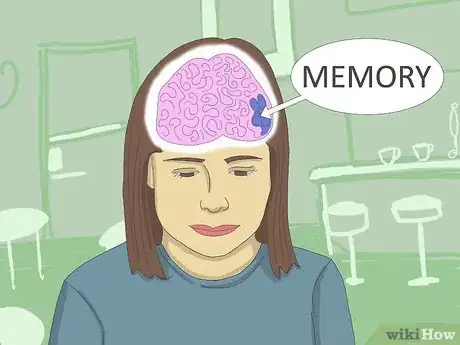
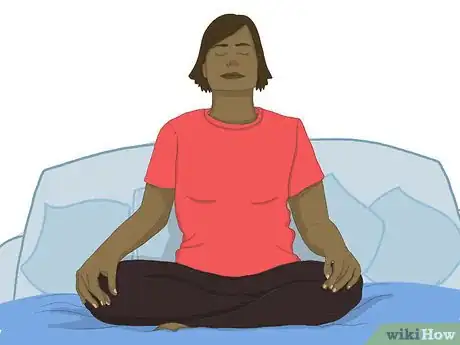


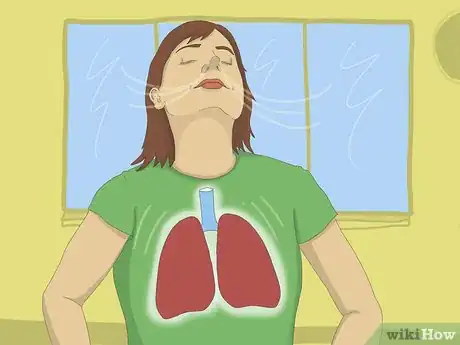
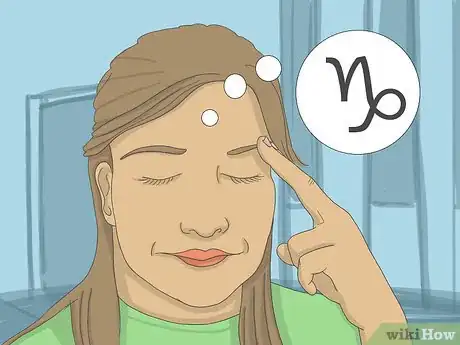
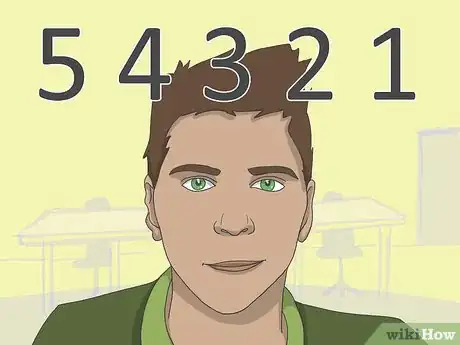





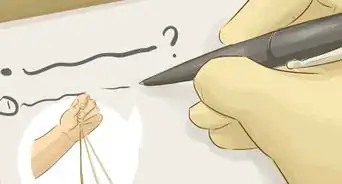
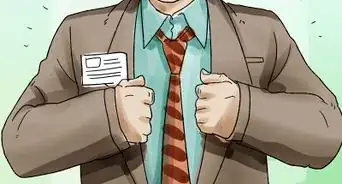
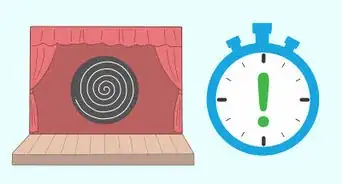




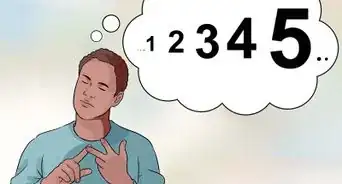

















































Medical Disclaimer
The content of this article is not intended to be a substitute for professional medical advice, examination, diagnosis, or treatment. You should always contact your doctor or other qualified healthcare professional before starting, changing, or stopping any kind of health treatment.
Read More...